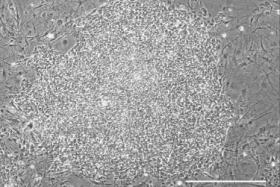
|
Researchers Identify Sustainable Source of Immunodeficiency Virus-resistant Immune Cells
1 April, 2022
 Image Caption: Monkey iPSCs with edited CCR5 locus growing in culture
Image Caption: Monkey iPSCs with edited CCR5 locus growing in culture
Image Credit: Saritha D'Souza, Wisconsin National Primate Research Center, USA
May unlock alternative approaches to treating HIV
Genetic engineering can make immune cells resistant to infection with human or monkey (simian) immunodeficiency virus (HIV and SIV, respectively). Recently, treatment with HIV-resistant immune cells has given encouraging results in patients. Stem cell researchers have now found ways of making large numbers of virus-resistant immune cells from monkeys, allowing future studies on safety and efficacy of immune therapy in a pre-clinical animal model. This encouraging research, recently published in Stem Cell Reports, will help scientists consider alternative approaches to treating HIV, the virus causing AIDS.
Worldwide, an estimated 37.7 billion people are infected with HIV. Medication is effective in suppressing virus replication and transmission but must be taken life-long on a daily basis, frequently cause side effects, and cannot fully eliminate the virus from the body.
HIV virus predominantly infects and kills certain immune cells called T cells, progressive weakening the patient’s immune system and increasing susceptibility to infections and certain cancers. A potentially effective way of eliminating infected cells and of restoring lost T cells is immunotherapy, where patients’ own T cells are genetically engineered in the lab to make them resistant to HIV infection and subsequently given back to patients. However, only a limited amount of genetically modified T cells can be produced in this way, and the procedures for T-cell isolation, modification, expansion, and re-infusion may compromise their functionality and survival.
An alternative way of producing T cells in large quantities is making them from induced pluripotent stem cells (iPSCs), which are immature, fast-replicating cells that can be made from patients’ blood or skin cells. iPSCs can be grown in the lab to high numbers, genetically modified, and subsequently be turned into T cells, thus generating large numbers of patient-specific T cells. To test this hypothesis, Igor Slukvin, MD, PhD, and colleagues from the University of Wisconsin have set up a pre-clinical model for generating and testing iPSC-derived engineered T cells from monkeys. Using the gene-editing tool, CRISPR/Cas9, researchers deleted the gene coding for a specific protein called CCR5, which is required for viral entry into T cells. Monkey iPSCs with CCR5 deletion were turned into T cells and challenged with simian immunodeficiency virus (SIV), a virus closely related to HIV. Encouragingly, the engineered T cells were protected from infection with SIV, while T cells with intact CCR5 could be readily infected. Follow-up experiments will show if iPSC-derived CCR5 depleted T cells can survive and function in SIV-infected monkeys, with the ultimate goal to control or even eliminate viral infection.
###
Media contact:
Kym Kilbourne
Director of Media and Strategic Communications
+1 847-929-4818 (o)
kkilbourne@isscr.org
www.isscr.org
Source: https://www.isscr.org/news-publicationsss/isscr-news-articles/article-listing/2022/04/01/researchers-identify-sustainable-source-of-immunodeficiency-virus-resistant-immune-cells
"Reproduced with permission - " International Society for Stem Cell Research "
International Society for Stem Cell Research
For more HIV and AIDS News visit...
Positively Positive - Living with HIV/AIDS:
HIV/AIDS News |